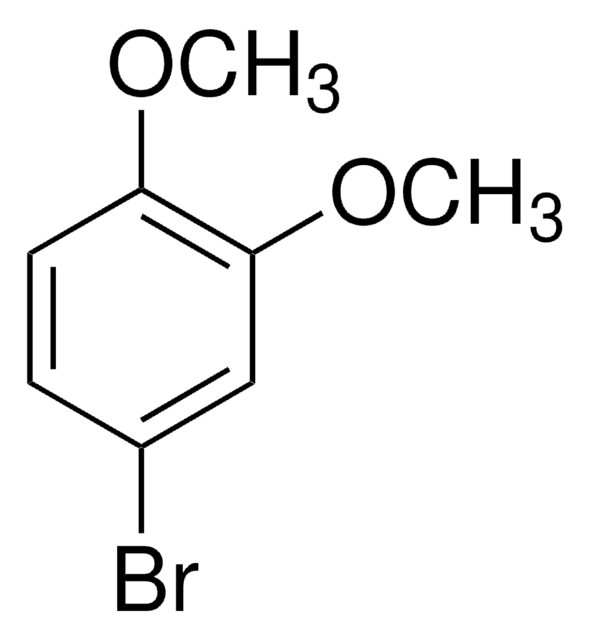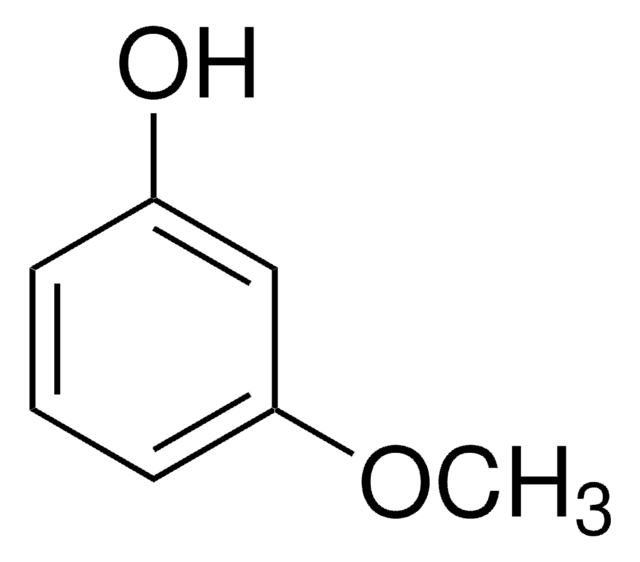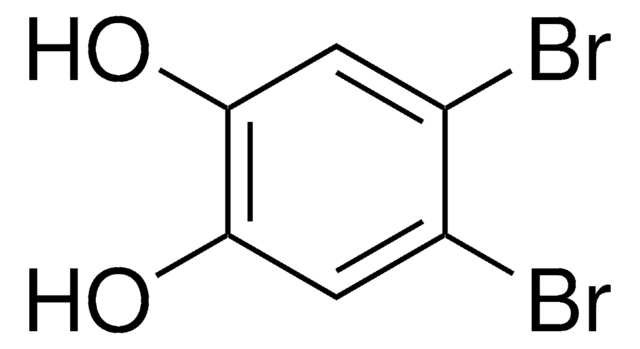148520
4-Chlorocatechol
97%
Se connecterpour consulter vos tarifs contractuels et ceux de votre entreprise/organisme
About This Item
Formule linéaire :
ClC6H3(OH)2
Numéro CAS:
Poids moléculaire :
144.56
Numéro CE :
Numéro MDL:
Code UNSPSC :
12352100
ID de substance PubChem :
Nomenclature NACRES :
NA.22
Produits recommandés
Niveau de qualité
Pureté
97%
Pf
90-94 °C (lit.)
Groupe fonctionnel
chloro
Chaîne SMILES
Oc1ccc(Cl)cc1O
InChI
1S/C6H5ClO2/c7-4-1-2-5(8)6(9)3-4/h1-3,8-9H
Clé InChI
WWOBYPKUYODHDG-UHFFFAOYSA-N
Catégories apparentées
Description générale
4-chlorocatechol was a major degradation product of 4-chloro-2-aminophenol (4C2AP). The degradation of 4-chlorocatechol was catalyzed by cphA-I enzyme.
Mention d'avertissement
Danger
Mentions de danger
Classification des risques
Skin Corr. 1B
Code de la classe de stockage
8A - Combustible corrosive hazardous materials
Classe de danger pour l'eau (WGK)
WGK 3
Point d'éclair (°F)
Not applicable
Point d'éclair (°C)
Not applicable
Équipement de protection individuelle
Eyeshields, Faceshields, Gloves, type P3 (EN 143) respirator cartridges
Faites votre choix parmi les versions les plus récentes :
Déjà en possession de ce produit ?
Retrouvez la documentation relative aux produits que vous avez récemment achetés dans la Bibliothèque de documents.
Les clients ont également consulté
A Farrell et al.
Journal of industrial microbiology & biotechnology, 28(6), 316-324 (2002-05-29)
A bacterium, CP1, identified as Pseudomonas putida strain, was investigated for its ability to grow on and degrade mono-chlorophenols and phenols as sole carbon sources in aerobic shaking batch culture. The organism degraded up to 1.56 mM 2- and 3-chlorophenol
M Klemba et al.
Applied and environmental microbiology, 66(8), 3255-3261 (2000-08-05)
The tcbR-tcbCDEF gene cluster, coding for the chlorocatechol ortho-cleavage pathway in Pseudomonas sp. strain P51, has been cloned into a Tn5-based minitransposon. The minitransposon carrying the tcb gene cluster and a kanamycin resistance gene was transferred to Pseudomonas putida KT2442
Yingxun Du et al.
Journal of hazardous materials, 139(1), 108-115 (2006-07-28)
The role of oxygen in the degradation pathway of 4-CP by Fenton system was investigated in this paper. The degradation of 4-CP, changes of Fenton reagent's concentration and formation of the intermediates in Fenton/O2 system were respectively compared with those
J K Kim et al.
Chemosphere, 69(5), 689-696 (2007-07-03)
The presence and impact of hydroxyl radicals generated via the catalytic decomposition of H(2)O(2) over heterogeneous copper catalysts were investigated by using two detection methods, an electron spin resonance-spin trapping method and a chemical probe method. Detection of the (5,5-dimethyl-1-pyrroline-N-oxide)-OH
A Farrell et al.
Biodegradation, 10(5), 353-362 (2000-06-28)
A mixed microbial community, specially designed to degrade a wide range of substituted aromatic compounds, was examined for its ability to degrade mono-chlorophenols as sole carbon source in aerobic batch cultures. The mixed culture degraded 2-, 3-, and 4-chlorophenol (1.56
Notre équipe de scientifiques dispose d'une expérience dans tous les secteurs de la recherche, notamment en sciences de la vie, science des matériaux, synthèse chimique, chromatographie, analyse et dans de nombreux autres domaines..
Contacter notre Service technique












